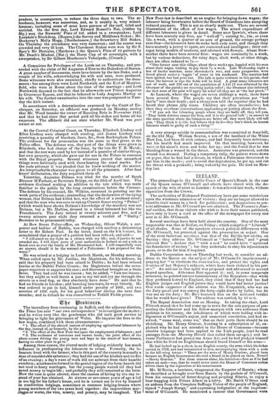Zbe 1Brobinces.
The incendiary fires continuing in Suffolk and the adjacent districts, The Times has sent "our own correspondent" to investigate the matter ; and he writes very like the gentleman who did such good service in bringing to light the grievances of Wales. He imputes the fires to the low wages, combined with these circumstances- " 1. The effect of the altered custom of employing agricultural labourers by -the day, instead of, as formerly, by the year.
"2. The effect of the New Poor-law upon the employment of labourers ; and "3. The enclosure of commons and vacant lands; the joint effect of the above causes driving the young men and boys to the resort of beer-houses, having no other place to go to." Among these causes, the altered mode of lodging evidently has much influence in predisposing the labourers to crime. Formerly, the la- lourers lived with the farmer, who in this part of the country is usually a man of considerable substance; they had the use of the kitchen and its fire of an evening; a day's want of work did not subtract from their humble -comforts ; attachments formed in the genial region of the farm-hearth did not tend to hasty marriages, but the young people waited till they had saved money to begin life ; and probably they still remained at the farm. Now the case is quite altered, since the custom of hiring by the day in- stead of year has obtained. At sixteen or seventeen years of age a lad is too big for his father's house, and he is tamed out to live by himself in comfortless lodgings, sometimes at common lodging-houses where young members of the two sexes herd together: the improvident mar- slues or worse, the vice, misery, and penury, may be imagined. The
New Poor-law is described as an engine for bringing down wages ; the labourer being browbeaten before the Board of Guardians into accepting reduced payment. This is not so clearly made out. There are several illustrations of the effect of low wages. The actual expenditure of different labourers is given in detail. Some near Ipswich, where there have been scarcely any fires, are " well off "; earning 9s., 10s., or even 12s. a week, with a quarter of an acre of ground, the cottage perhaps rent-free—the labourers here do make both ends meet, and though they have scarcely a penny to spare, are contented and intelligent ; their cot- tages being models of neatness, and adorned with flowers. About Stow- market there have been several fires: wages are nominally 9s. a week, but by various deductions, for rainy days, slack work, or other things, they are often reduced to 7s.— " One farmer near this village, about three weeks ago, haggled with his men about their wages, wishing to pay them 7s. a week. Last Wednesday night a box of lucifer matches, some shoemaker's wax, and some gunpowder, were found placed under a • loggia ' of straw in his stackyard. The matches had been ignited, but had gone out. The talk is quite common in this pariah, that when the harvest is ripe the fields will be fired. A great many labourers are out of work, and 236 out of the population of 1,141 (I was informed by the Overseer of the parish) are receiving parish-relief ; the Overseer also informed me that none of the poor will apply for relief till they are at 'the last pinch.'" At Lameeh, where the wages are seven shillings a week, there have been several fires. The people say that their privations put "bad tho'ts " into their heads ; and a clergyman told the reporter that he had. heard that phrase fifty times. Children are often incendiaries ; but then they overhear conversations applauding or jesting about the fires. " If you ask the labouring people where they are badly off, they tell you. They think distress causes the fires, and it is the general talk '; in answer to the same question where the labourers are better off, they most likely will tell you, They think it is idle bad fellows that do it—they don't think an honest labourer would be guilty of such a thing."
A very strange suicide in somnambulism was committed at Ampthill, on the 23d May. William Sexton, a son of the landlord of the White Hart Inn, had been ill with asthma, and had frequently been delirious ; but his health had much improved. On that morning, however, he went to his sister's room and woke her up ; and she found that he was bleeding from a wound in the throat. Assistance was procured, and the wound was dressed. During a temporary rally, the patient wrote down on paper, that he had had a dream, in which a Policeman threatened to put him in the stocks ; and to avoid that degradation, he got up, and cut his throat with a penknife; being waked by the pain, He died on Mon- day last.


























 Previous page
Previous page